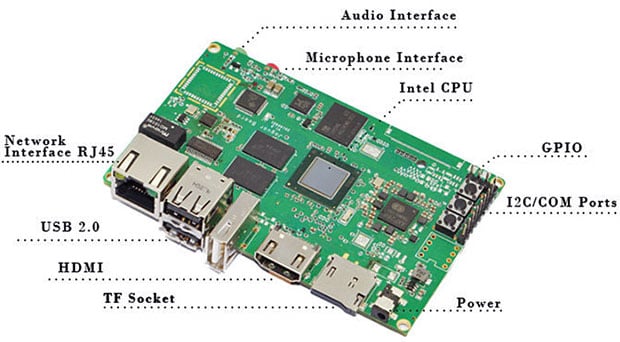JaguarBoard Intel Atom Powered Single-Board Mini PC To Take On Raspberry Pi At $45
The teeny-tiny PC movement that's leading the Internet of Things (IoT) category is largely dominated by ARM-based processors, and for good reason—they're cheap and capable. That's fine and dandy, but what if you prefer to work with a x86 architecture? You have options, one of them being JaguarBoard, a mini PC project that's currently in search of funding on Kickstarter.
JaguarBoard looks strikingly similar to Raspberry Pi, which is arguably the most popular credit card sized PC out there. But unlike Raspberry Pi, JaguarBoard allows users to code for a x86 architecture courtesy of its Intel Atom Z3735G (Bay Trail) foundation (similar to the CPU you'll find in Lenovo's Yoga Tablet 2). The spunky chip is a quad-core part clocked at 1.33GHz to 1.83GHz with 2MB of L2 cache, offering a fair amount of horsepower for IoT applications. And of course for some it means working in familiar territory.

"Being based on the x86 architecture brings JaguarBoard better performance, with high level of scalability and compatibility. It allows developers and DIYers who are experienced with x86 architecture to enjoy the single board software development without having to learn about embedded systems such as ARM," Jaguar Electronic explains.
In addition to an Atom processor, JaguarBoard also boasts 1GB of DDR3L memory, 16GB of eMMC storage, three USB 2.0 ports, 10/100M LAN port, HDMI 1.4 output, SDIO 3.0 socket, two COM ports, four GPIO pins, and audio ports.

It's quite the package and for early birds who pounced on the Kickstarter campaign, it was a steal at $45 and $50, either of which may hint at its final price tag. Those tiers are all gone, though you can still snag one for $65, which comes bundled with a USB hub and 16GB TF card to help offset the price difference.
Just as there are many potential applications for Raspberry Pi, the same is true of JaguarBoard. You can use it strictly as a mini PC for general purpose computing, as an embedded system, a learning or research tool, or for whatever DIY projects you can conjure up.
There are just 30 hours left in the Kickstarter campaign. With nearly $24,000 raised from several hundred backers, it's blown way past its goal of $3,000, though you can still pledge at one of the one of reward tiers.
JaguarBoard looks strikingly similar to Raspberry Pi, which is arguably the most popular credit card sized PC out there. But unlike Raspberry Pi, JaguarBoard allows users to code for a x86 architecture courtesy of its Intel Atom Z3735G (Bay Trail) foundation (similar to the CPU you'll find in Lenovo's Yoga Tablet 2). The spunky chip is a quad-core part clocked at 1.33GHz to 1.83GHz with 2MB of L2 cache, offering a fair amount of horsepower for IoT applications. And of course for some it means working in familiar territory.

"Being based on the x86 architecture brings JaguarBoard better performance, with high level of scalability and compatibility. It allows developers and DIYers who are experienced with x86 architecture to enjoy the single board software development without having to learn about embedded systems such as ARM," Jaguar Electronic explains.
In addition to an Atom processor, JaguarBoard also boasts 1GB of DDR3L memory, 16GB of eMMC storage, three USB 2.0 ports, 10/100M LAN port, HDMI 1.4 output, SDIO 3.0 socket, two COM ports, four GPIO pins, and audio ports.

Just as there are many potential applications for Raspberry Pi, the same is true of JaguarBoard. You can use it strictly as a mini PC for general purpose computing, as an embedded system, a learning or research tool, or for whatever DIY projects you can conjure up.
There are just 30 hours left in the Kickstarter campaign. With nearly $24,000 raised from several hundred backers, it's blown way past its goal of $3,000, though you can still pledge at one of the one of reward tiers.

